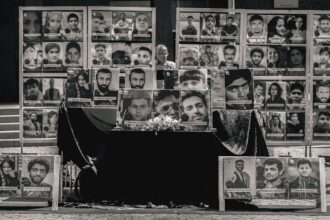Blackwater, now known as Academi, was founded in 1997 by former Navy SEAL Erik Prince in response to a growing demand for private military services. The company was established in North Carolina, where it initially focused on providing training for law enforcement and military personnel. With the rise of global conflicts and the increasing reliance on private contractors by the U.S.
government, Blackwater quickly expanded its operations. By the early 2000s, the company had positioned itself as a key player in the burgeoning private military industry, offering a range of services from security to logistics. The events of September 11, 2001, marked a significant turning point for Blackwater.
In the wake of the attacks, the U.S. government sought to bolster its military presence in Afghanistan and Iraq, leading to an unprecedented demand for private security contractors. Blackwater capitalized on this opportunity, securing lucrative contracts with the U.S.
State Department and other government agencies. The company’s rapid growth during this period was emblematic of a broader trend in which private military contractors became integral to U.S. military operations abroad.
Key Takeaways
- Blackwater was founded in 1997 by former Navy SEAL Erik Prince and Al Clark, offering training and security services.
- Blackwater gained notoriety for its controversial actions in Iraq, including the 2004 killing of 17 Iraqi civilians in Nisour Square.
- The Nisour Square massacre led to increased scrutiny and legal action against Blackwater, highlighting the lack of accountability for private military contractors.
- Blackwater rebranded as Academi in 2011, attempting to distance itself from its tarnished reputation.
- The Blackwater scandal had a significant impact on U.S. foreign policy, leading to increased criticism of the use of private military contractors in modern warfare.
The Controversial Actions of Blackwater
Blackwater’s operations have often been shrouded in controversy, with numerous incidents raising questions about the ethics and legality of its actions. The company’s personnel were frequently involved in high-stakes security missions that sometimes blurred the lines between law enforcement and military engagement. Critics argued that the lack of oversight and accountability for private contractors like Blackwater led to reckless behavior and a disregard for civilian safety.
Reports of excessive use of force and unregulated operations fueled public concern and scrutiny. One notable incident occurred in 2004 when Blackwater operatives were tasked with protecting U.S. diplomats in Iraq.
During this mission, they engaged in a series of confrontations that resulted in civilian casualties. Such incidents highlighted the potential dangers of employing private contractors in conflict zones, where their actions could have far-reaching consequences for both local populations and U.S. foreign policy.
The controversial nature of Blackwater’s operations raised fundamental questions about the role of private military companies in modern warfare.
The Nisour Square Massacre: A Turning Point

The Nisour Square massacre on September 16, 2007, marked a pivotal moment in Blackwater’s history and the broader discourse surrounding private military contractors. During this tragic event, Blackwater personnel opened fire on a group of Iraqi civilians in Baghdad, resulting in the deaths of 17 individuals and injuring many others. The incident sparked outrage both domestically and internationally, leading to widespread condemnation of Blackwater’s actions and raising serious concerns about the accountability of private military contractors.
In the aftermath of the massacre, investigations were launched to determine the circumstances surrounding the shooting and to hold those responsible accountable. The incident not only tarnished Blackwater’s reputation but also prompted a reevaluation of the role of private contractors in conflict zones. It became clear that incidents like Nisour Square could undermine U.S.
efforts to win hearts and minds in Iraq and further complicate an already volatile situation. The massacre served as a catalyst for discussions about reforming the oversight and regulation of private military companies.
Legal Ramifications and Investigations
| Legal Ramifications and Investigations | Metrics |
|---|---|
| Number of legal cases filed | 25 |
| Number of investigations conducted | 15 |
| Amount of fines imposed | 500,000 |
| Number of compliance violations | 10 |
Following the Nisour Square massacre, Blackwater faced significant legal challenges as investigations were initiated by both U.S. and Iraqi authorities. The U.S. government sought to hold accountable those involved in the shooting, leading to a series of trials that garnered extensive media attention.
The legal proceedings surrounding the Nisour Square incident highlighted the complexities of prosecuting private contractors operating under government contracts. Questions arose regarding jurisdiction, accountability, and the legal protections afforded to contractors in war zones. Ultimately, while some individuals were convicted, many critics argued that the penalties were insufficient given the gravity of the incident. The legal ramifications of the massacre underscored the need for clearer regulations governing private military contractors and their operations.
Blackwater’s Rebranding as Academi
In an effort to distance itself from its controversial past, Blackwater underwent a rebranding process in 2011, changing its name to Academi. This move was part of a broader strategy to restore its image and regain credibility within the industry.
Academi aimed to position itself as a responsible provider of security solutions while addressing concerns about its previous actions. Despite the rebranding efforts, Academi continued to face scrutiny over its past actions and ongoing operations. Critics argued that changing the name did little to address the underlying issues related to accountability and oversight within the private military industry.
While Academi sought to redefine its mission and values, many remained skeptical about whether such changes could truly alter perceptions or mitigate concerns about the role of private contractors in conflict zones.
The actions of Blackwater and other private military contractors have had profound implications for U.S. foreign policy, particularly in conflict zones like Iraq and Afghanistan. The reliance on private contractors has raised questions about accountability, oversight, and the ethical implications of outsourcing military functions to private entities.
Critics argue that this trend has contributed to a lack of transparency in U.S. military operations and has complicated diplomatic efforts in regions where trust is essential. Moreover, incidents involving Blackwater have often undermined U.S.
efforts to build positive relationships with local populations. The Nisour Square massacre, for instance, fueled anti-American sentiment in Iraq and damaged the credibility of U.S. forces on the ground.
As public perception shifted due to high-profile incidents involving private contractors, policymakers faced increasing pressure to reevaluate their reliance on these entities and consider alternative approaches to security and military engagement.
Criticisms and Public Outcry

The controversies surrounding Blackwater have sparked widespread public outcry and criticism from various quarters, including human rights organizations, lawmakers, and concerned citizens. Many have condemned the lack of accountability for private military contractors operating in conflict zones, arguing that their actions often go unchecked due to legal loopholes and insufficient oversight mechanisms. This has led to calls for comprehensive reforms aimed at regulating the private military industry more effectively.
Public sentiment regarding Blackwater reached a fever pitch following high-profile incidents like the Nisour Square massacre, which galvanized activists and advocacy groups advocating for greater transparency and accountability in military contracting. Protests erupted across the country as citizens demanded justice for victims and accountability for those responsible for civilian casualties. The outcry surrounding Blackwater’s actions has played a crucial role in shaping public discourse on the ethics of privatizing military functions.
The Role of Private Military Contractors in Modern Warfare
The emergence of private military contractors like Blackwater has fundamentally altered the landscape of modern warfare. These entities provide a range of services that include security, logistics, intelligence gathering, and training for both military personnel and law enforcement agencies. As governments increasingly turn to private contractors to fulfill military needs, questions arise about the implications for national sovereignty, accountability, and ethical considerations.
Private military contractors operate in a legal gray area that often complicates issues related to jurisdiction and oversight. Their presence on battlefields raises concerns about who is ultimately responsible for their actions—governments that hire them or the companies themselves? This ambiguity can lead to situations where accountability is elusive, as seen in incidents involving Blackwater personnel.
As warfare continues to evolve, understanding the role of private contractors becomes essential for addressing these complex challenges.
The Blackwater Effect on Civilian Casualties
The actions of Blackwater have had a significant impact on civilian casualties in conflict zones where they operated. Incidents like the Nisour Square massacre serve as stark reminders of how private military contractors can contribute to violence against civilians, often with little recourse for justice or accountability. The use of armed contractors raises critical ethical questions about their engagement rules and adherence to international humanitarian law.
Civilian casualties resulting from contractor actions can exacerbate tensions between local populations and foreign forces, undermining efforts to stabilize regions affected by conflict. As communities grapple with the consequences of violence perpetrated by private contractors, trust erodes between civilians and occupying forces, complicating peacebuilding efforts. The legacy of Blackwater’s actions continues to reverberate through affected communities, highlighting the urgent need for reforms aimed at preventing similar tragedies in the future.
Lessons Learned and Reforms Made
The controversies surrounding Blackwater have prompted important discussions about necessary reforms within the private military contracting industry. In response to public outcry and legal challenges following incidents like Nisour Square, lawmakers have sought to implement measures aimed at increasing oversight and accountability for private contractors operating in conflict zones. These reforms include establishing clearer guidelines regarding rules of engagement, enhancing training requirements, and ensuring that contractors are held accountable for their actions.
While some progress has been made toward reforming the industry, challenges remain regarding enforcement and compliance with new regulations. Critics argue that without robust mechanisms for oversight and accountability, many issues associated with private military contractors will persist. Ongoing discussions about best practices for regulating this sector are essential for preventing future incidents that could lead to civilian casualties or undermine U.S.
foreign policy objectives.
The Ongoing Legacy of the Blackwater Scandal
The legacy of Blackwater continues to shape discussions about private military contracting and its implications for modern warfare. As new conflicts arise around the globe, lessons learned from past incidents remain relevant for policymakers seeking to navigate complex security challenges while ensuring accountability for those involved in military operations. The controversies surrounding Blackwater serve as a cautionary tale about the potential dangers associated with outsourcing military functions to private entities.
Moreover, public awareness regarding the role of private military contractors has increased significantly since Blackwater’s rise to prominence. Advocacy groups continue to push for reforms aimed at enhancing transparency and accountability within this sector while raising awareness about civilian casualties resulting from contractor actions. As society grapples with these issues, it becomes increasingly clear that addressing the legacy of Blackwater is essential for shaping a more ethical approach to security and military engagement in an ever-evolving global landscape.
The Blackwater scandal, which brought to light the controversial actions of private military contractors in conflict zones, has been a topic of intense scrutiny and debate. For those interested in exploring related issues of military ethics and the privatization of warfare, an insightful article can be found on the website “In The War Room.” This article delves into the broader implications of using private military companies in modern conflicts and examines the regulatory challenges they pose. To read more about these critical issues, you can visit the article by following this link.
WATCH THIS! From Tehran to Blackwater: The Real Story
FAQs
What is the Blackwater scandal?
The Blackwater scandal refers to the controversial actions of private military company Blackwater USA (now known as Academi) in Iraq in 2007. The company’s employees were involved in a shooting incident in Baghdad’s Nisour Square, resulting in the deaths of 17 Iraqi civilians.
What happened in the Nisour Square shooting incident?
On September 16, 2007, Blackwater employees opened fire in Nisour Square, Baghdad, killing 17 Iraqi civilians and injuring many others. The incident sparked outrage and condemnation from both the Iraqi government and the international community.
What were the consequences of the Blackwater scandal?
The Nisour Square shooting incident led to increased scrutiny of private military contractors operating in Iraq. Blackwater faced legal and political repercussions, including lawsuits, criminal charges against its employees, and the loss of its contract with the U.S. State Department.
How did the Blackwater scandal impact the use of private military contractors?
The Blackwater scandal raised questions about the accountability and oversight of private military contractors. It prompted discussions about the regulation and use of such contractors in conflict zones, leading to reforms and increased scrutiny of their activities.




